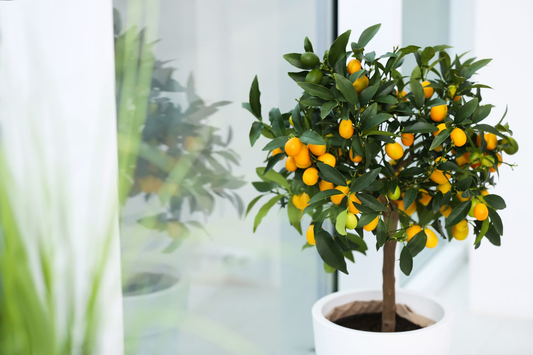Benefits of Houseplants for Health
Share
- 1. Introduction
- 2. Psychological Benefits of Houseplants
- 3. Houseplants as Air Purifiers
- 4. How Houseplants Improve Sleep Quality
- 5. The Role of Houseplants in Boosting Immunity
- 6. Enhancing Mental Focus and Cognitive Function
- 7. Physical Benefits of Houseplants: Stress Reduction and Blood Pressure
- 8. Social and Emotional Benefits of Caring for Houseplants
- 9. Houseplants as Natural Humidifiers
- 10. Houseplants as Natural Mood Lifters
- 11. Which Houseplants Offer the Best Health Benefits?
- 12. Environmental and Sustainability Benefits of Houseplants
- 13. How to Incorporate Houseplants Into Your Home for Maximum Health Benefits
- 14. Potential Downsides of Having Houseplants
- 15. Conclusion
- 16. FAQ - Frequently Asked Questions
1. Introduction
In recent years, the trend of incorporating houseplants into home decor has experienced a significant surge. With urban spaces becoming smaller and people spending more time indoors, the need for green, natural elements has grown. As a result, houseplants are now a central part of modern living spaces. But it's not just about aesthetics; houseplants are increasingly being recognized for their wide array of health benefits, offering a solution to both environmental and psychological concerns. Here's a closer look at why houseplants are becoming an essential component of well-being:
- Psychological benefits: Houseplants help reduce stress, promote relaxation, and enhance overall mental health.
- Physical benefits: From improving air quality to boosting immunity, houseplants offer numerous physical health advantages.
- Environmental impact: Plants not only purify the air but also help in creating a more sustainable and eco-friendly living environment.
The following sections will delve deeper into the various ways houseplants contribute to improving both mental and physical health. Whether you are looking to reduce stress, improve sleep, or purify the air in your home, there is a plant for every need. As you continue reading, you’ll discover:
- The psychological benefits of houseplants.
- How houseplants improve air quality and contribute to respiratory health.
- The relationship between houseplants and better sleep quality.
- The role of plants in boosting immunity and reducing stress.
- How to choose and care for plants to maximize their health benefits.
Let's explore these topics further and uncover the health-boosting power of houseplants!

2. Psychological Benefits of Houseplants
Houseplants have been shown to provide more than just aesthetic value. They play a crucial role in enhancing mental well-being, with studies showing that incorporating plants into your living or working environment can significantly reduce stress and anxiety levels. Below are the key psychological benefits of having houseplants at home:
- Stress Reduction: One of the most well-known psychological benefits of houseplants is their ability to reduce stress. Research has demonstrated that simply being around plants can lower heart rate and blood pressure, creating a calming effect. By bringing a natural element into our homes, plants help to soothe the mind and promote relaxation.
- Reducing Anxiety: Studies have also indicated that the presence of plants can help alleviate anxiety. Interaction with plants or even just viewing them can lead to a significant reduction in feelings of tension and unease. For instance, a study published in HortTechnology found that individuals who spent time interacting with plants experienced lower anxiety levels than those who didn't.
- Increased Happiness: Numerous studies have found that houseplants can increase happiness and overall well-being. When people are surrounded by greenery, they report feeling happier, more energized, and more content. Plants trigger positive emotions and a sense of accomplishment, especially when they thrive in your care.
Plants not only reduce stress and anxiety but also improve mood, making your living environment more peaceful and harmonious. Here’s how:
- Creating a Peaceful Environment: Plants contribute to a tranquil atmosphere by adding natural beauty and serenity. Their calming effect can enhance concentration and productivity while fostering a sense of peace in both home and workspaces.
- Improved Focus and Mindfulness: Caring for plants encourages mindfulness, as tending to them forces individuals to slow down and focus on the present moment, providing a sense of accomplishment.
3. Houseplants as Air Purifiers
One of the most significant and well-researched benefits of houseplants is their ability to purify the air. Plants naturally filter indoor air by absorbing harmful toxins and releasing oxygen, creating a healthier living environment. Here’s how houseplants act as air purifiers:
- Absorption of Toxins: Plants absorb harmful chemicals like formaldehyde, benzene, and trichloroethylene from the air through their leaves and roots. This process helps to remove pollutants that can affect respiratory health and overall well-being.
- Natural Oxygen Production: During photosynthesis, plants release oxygen into the air, which helps to improve air quality. This oxygen boost benefits overall health, enhancing energy levels and supporting cognitive function.
- Transpiration Process: Through transpiration, plants release water vapor into the air, which not only increases humidity but also helps clean the air by trapping particulate matter. This process can be especially beneficial in dry indoor environments.
Several houseplants are particularly known for their air-purifying properties. Here are a few of the top plants to consider for improving air quality in your home:
- Spider Plant (Chlorophytum comosum): Known for its ability to remove toxins like formaldehyde and xylene, the spider plant is an excellent air purifier that thrives in indirect sunlight.
- Peace Lily (Spathiphyllum): Peace lilies are renowned for their ability to remove airborne pollutants such as ammonia, benzene, and formaldehyde. They also have the added benefit of being easy to care for.
- Aloe Vera: In addition to its skin-healing properties, aloe vera can filter formaldehyde and benzene from the air. It’s a low-maintenance plant that thrives in sunny spots.
- Snake Plant (Sansevieria): Known for its ability to filter formaldehyde, xylene, and toluene, the snake plant is one of the best choices for improving indoor air quality. It’s perfect for beginners due to its low-maintenance nature.
Better air quality provides numerous benefits for respiratory health and overall well-being:
- Improved Respiratory Health: Cleaner air reduces the risk of respiratory issues, such as asthma, allergies, and chronic coughing. It also supports better lung function and enhances breathing.
- Boosted Immunity: Cleaner air helps strengthen the immune system by reducing exposure to harmful pollutants, thereby lowering the chances of illnesses like colds and flu.

4. How Houseplants Improve Sleep Quality
Houseplants not only enhance the aesthetics of your home but also contribute to better sleep quality. Certain plants have unique properties that promote relaxation, reduce anxiety, and improve sleep by creating a calm and peaceful environment. Here’s how plants help improve sleep:
- Relaxing Fragrances: Some plants, like lavender and jasmine, release soothing scents that are known to reduce stress and anxiety, promoting a more restful night’s sleep. These fragrances can lower heart rate and relax the nervous system, making it easier to fall asleep.
- Nighttime Oxygen Release: Most plants release oxygen during the day, but a select few continue this process at night, helping to improve air quality and provide a fresh atmosphere. Aloe vera, for instance, is one such plant that releases oxygen at night, which can promote deeper and more restorative sleep.
- Calming Visuals: The presence of plants in the bedroom provides a calming effect due to their natural beauty and peaceful aesthetic. This soothing environment can help signal the body that it’s time to wind down and prepare for sleep.
Here are some specific plants that are known for promoting relaxation and improving sleep quality:
- Lavender: Lavender is renowned for its calming fragrance, which has been shown to promote sleep by reducing anxiety and improving overall relaxation.
- Jasmine: The sweet scent of jasmine has been linked to improved sleep quality and a reduction in restlessness. Studies have shown that people who sleep in a room with jasmine plants experience more restful sleep.
- Aloe Vera: In addition to its air-purifying properties, aloe vera helps to release oxygen during the night, making it an excellent plant for improving sleep quality.
Scientific studies have shown that better sleep is directly linked to overall health improvements, such as improved cognitive function, better mood regulation, and a strengthened immune system. When we sleep well, our bodies can recover, our brains can process emotions, and we wake up feeling more energized and ready to face the day. Houseplants, by promoting relaxation and enhancing air quality, play an essential role in achieving these health benefits.
5. The Role of Houseplants in Boosting Immunity
Houseplants contribute to overall health in more ways than one, including boosting immunity. By improving indoor air quality, increasing humidity, and reducing harmful pollutants, houseplants create an environment that strengthens the immune system. Here’s how plants play a role in boosting immunity:
- Air Purification: Plants naturally purify the air by absorbing harmful toxins and releasing oxygen. Cleaner air improves the respiratory system’s efficiency, allowing the immune system to function at its best. With fewer pollutants in the air, the body is less stressed, and the immune system can focus on defending against illnesses.
- Humidity Regulation: Plants release water vapor into the air through a process called transpiration. This increases indoor humidity levels, which is particularly beneficial during the dry winter months. Proper humidity helps prevent dry skin, irritated respiratory passages, and sinus issues, which can make you more susceptible to colds and other infections.
- Stress Reduction: Chronic stress can weaken the immune system over time, making the body more vulnerable to illness. Houseplants, with their calming presence and air-purifying qualities, help reduce stress and anxiety, allowing the immune system to operate more effectively.
Increasing humidity is one of the most beneficial ways houseplants can support the immune system. As plants release water vapor, they maintain a comfortable level of humidity in the air, reducing issues related to dry skin and respiratory problems such as nasal congestion, dry throat, and dry eyes. Here’s how this works:
- Skin Health: Higher humidity helps retain moisture in the skin, reducing the risk of irritation and cracking that often occurs in dry indoor environments.
- Respiratory Health: Proper humidity can prevent dryness in the nasal passages, throat, and lungs, helping to alleviate common symptoms associated with respiratory infections and allergies.
The relationship between cleaner air and fewer allergies or colds is also important. By improving indoor air quality, houseplants reduce the presence of dust, pollen, and other allergens. This helps minimize allergy symptoms, including sneezing, congestion, and itchy eyes. With fewer airborne irritants, the immune system is less likely to be triggered, which can lead to fewer colds and better overall health.

6. Enhancing Mental Focus and Cognitive Function
Houseplants have been shown to improve mental focus and cognitive function in various ways. The natural presence of plants in the environment creates a setting that fosters concentration, mental clarity, and overall brain performance. Here’s how houseplants contribute to enhanced cognitive function:
- Improved Air Quality: Clean, fresh air is crucial for optimal brain function. Houseplants purify the air by removing toxins and releasing oxygen, which directly supports brain health and improves mental clarity.
- Increased Humidity: As houseplants release water vapor, they help increase indoor humidity. Higher humidity levels can reduce fatigue and make it easier to focus, as dry environments can lead to discomfort and lack of concentration.
- Calming Effect: The presence of plants has a calming influence, reducing stress and anxiety. This allows the brain to function at its best, helping to maintain focus on tasks without being distracted by stressors.
The link between nature and improved cognitive function is supported by numerous studies. Spending time in nature, or even just being around plants indoors, can lead to:
- Reduced Mental Fatigue: Exposure to nature and plants has been shown to reduce mental fatigue and restore cognitive energy, helping individuals feel more alert and focused after spending time in green environments.
- Improved Memory and Learning: Studies have demonstrated that being in a natural environment or surrounded by plants can improve short-term memory, creativity, and problem-solving abilities.
Several studies have shown that incorporating plants into office spaces can lead to higher productivity and improved concentration. In one study, employees working in environments with plants experienced increased productivity, reduced stress, and improved cognitive function, demonstrating that a green workspace promotes mental well-being and efficiency.
7. Physical Benefits of Houseplants: Stress Reduction and Blood Pressure
Houseplants not only benefit mental health, but they also provide significant physical benefits, especially when it comes to reducing stress and improving cardiovascular health. Studies have shown that being around plants can help lower blood pressure, reduce stress, and calm the nervous system. Here's how plants contribute to physical health:
- Reduction of Stress Hormones: Studies have shown that simply being in the presence of plants can lower levels of cortisol, the primary stress hormone. Reduced cortisol levels help prevent the physical symptoms of stress, such as high blood pressure, and promote relaxation.
- Calming Effect on the Nervous System: Houseplants have a natural calming effect on the nervous system. The act of tending to plants or simply being around them has been shown to reduce heart rate, lower blood pressure, and ease muscle tension, all of which help to alleviate the physical symptoms of stress.
- Improved Cardiovascular Health: Lower blood pressure is directly linked to improved cardiovascular health. By reducing stress and calming the nervous system, houseplants contribute to a healthier heart and reduce the risk of stress-related health issues, such as hypertension and heart disease.
Here are a few examples of plants that have been shown to reduce stress and promote physical well-being:
- Snake Plant (Sansevieria): Known for its air-purifying qualities, the snake plant also has a calming effect on the nervous system. Studies have shown that simply having a snake plant in the home or office can help reduce stress and lower blood pressure.
- Lavender: Lavender’s soothing fragrance has been shown to reduce heart rate and blood pressure. Its calming effect helps relieve stress and anxiety, promoting relaxation and physical well-being.
- Aloe Vera: Aloe vera is another plant that can have a calming effect on both the body and mind. Its presence in the home can help reduce stress, lower blood pressure, and promote a sense of tranquility.
8. Social and Emotional Benefits of Caring for Houseplants
Caring for houseplants offers significant social and emotional benefits, providing not just a hobby, but also a positive impact on mental well-being. The act of nurturing plants can contribute to a healthier emotional state and a greater sense of responsibility and accomplishment. Here’s how caring for houseplants can benefit emotional health:
- Creating a Routine: Caring for plants encourages a consistent daily or weekly routine. This regularity helps provide structure, which is particularly beneficial for individuals who may experience stress or anxiety from a lack of routine. Regular plant care offers a calming ritual, giving people something to look forward to every day.
- Sense of Responsibility: Nurturing a plant instills a sense of responsibility and accountability. This responsibility, no matter how small, can contribute to a person’s overall sense of purpose and improve emotional well-being. The act of caring for something living can build self-esteem and foster a deeper connection to nature.
- Therapeutic Effects: Caring for plants can be an incredibly therapeutic activity. The tactile nature of gardening, such as watering, pruning, or repotting, offers a soothing experience that helps reduce stress, calm the mind, and improve emotional health. This repetitive activity allows the mind to focus on the task at hand, providing a break from life’s stresses.
- Sense of Accomplishment: Watching a plant grow and thrive can provide a deep sense of accomplishment and fulfillment. Successfully growing a healthy plant brings joy and pride, boosting confidence and improving emotional well-being. The visible results of care serve as tangible evidence of one's nurturing efforts.

9. Houseplants as Natural Humidifiers
Houseplants play an essential role in maintaining optimal indoor humidity levels through a natural process known as transpiration. This process not only contributes to a healthier indoor environment but also provides a range of benefits for respiratory and skin health. Here's how houseplants function as natural humidifiers:
- Transpiration Process: Transpiration is the process by which plants absorb water through their roots and release moisture into the air through small pores in their leaves. This moisture helps increase humidity levels in the surrounding environment, especially in areas with dry indoor air.
- Increased Humidity: When plants release water vapor, they naturally raise the humidity levels indoors. This is especially beneficial during the colder months when indoor heating systems can dry out the air. Proper humidity levels are essential for comfort and health, helping to prevent dry skin, irritated sinuses, and respiratory issues.
- Respiratory Health: Higher humidity levels can help keep the airways hydrated, reducing the risk of respiratory issues such as dry throat, cough, or congestion. Proper humidity also helps prevent irritation in the lungs and nasal passages, making breathing easier, especially for those with allergies or asthma.
- Skin Health: Increased humidity can have a positive impact on skin health. It prevents skin from becoming excessively dry and irritated, which is a common issue in dry indoor environments. Humid air helps retain moisture in the skin, leading to softer and more hydrated skin.
Some of the best houseplants known for their humidifying effects include:
- Ferns: Ferns are excellent at releasing moisture into the air. Plants like Boston ferns and Maidenhair ferns are particularly effective in increasing humidity levels.
- Peace Lilies: Peace lilies are another great option for boosting indoor humidity. Their ability to absorb and release moisture makes them ideal for creating a more comfortable living environment.
- Areca Palm: Known for its air-purifying abilities, the Areca palm also releases large amounts of moisture, making it a powerful natural humidifier.
10. Houseplants as Natural Mood Lifters
Houseplants are not only a treat for the eyes but also have the power to uplift one’s mood. Bright, vibrant plants contribute to emotional well-being by providing a sense of tranquility and joy. Here's how houseplants can act as natural mood lifters:
- Bright, Vibrant Plants: The presence of colorful and lively plants can instantly boost your mood. Plants like vibrant flowering varieties or lush green foliage create a lively atmosphere that fosters a positive mindset. Their vibrancy helps counteract feelings of sadness or stress, making them ideal for spaces that require emotional rejuvenation.
- Psychological Impact of Colors: The colors found in plants have a psychological effect on our emotions. Green, for example, is known for its calming properties and is often associated with relaxation and balance. On the other hand, colorful flowers such as red, yellow, and orange can inspire feelings of happiness, energy, and joy. These colors help create a positive, uplifting environment.
- Plants in Personal Spaces: Placing houseplants in personal spaces such as the living room, bedroom, or office can have profound effects on mental health. Having plants nearby offers a constant reminder of nature, helping to reduce stress, improve focus, and create an overall sense of well-being. These areas are where we spend most of our time, and the presence of plants enhances our emotional connection to these spaces.
11. Which Houseplants Offer the Best Health Benefits?
Several houseplants provide remarkable health benefits, from improving air quality to promoting better sleep and reducing stress. Here’s a look at some of the best houseplants and their associated health benefits:
| Plant Name | Health Benefits | Ideal Location |
|---|---|---|
| Spider Plant | Air purification, stress reduction | Living rooms, kitchens |
| Aloe Vera | Skin healing, air purification | Bathrooms, sunny areas |
| Lavender | Sleep aid, stress reduction | Bedrooms, offices |
| Snake Plant | Air purification, stress reduction | Bedrooms, low light areas |
| Peace Lily | Air purification, humidification | Living rooms, bathrooms |
In conclusion, each of these houseplants offers unique health benefits and can be strategically placed around the home for maximum impact on your well-being. Whether you’re looking to purify the air, reduce stress, or improve sleep, these plants are excellent additions to any living space.
12. Environmental and Sustainability Benefits of Houseplants
Houseplants do more than improve our health; they also play a vital role in enhancing the environment. By incorporating plants into our homes, we contribute to a greener planet in the following ways:
- Reducing Carbon Footprint: Houseplants absorb carbon dioxide and release oxygen, making them a natural tool for reducing indoor air pollution. This helps improve air quality while contributing to reducing overall carbon footprints, especially in urban settings where outdoor greenery may be limited.
- Promoting Sustainability: Indoor plants help us reconnect with nature in sustainable ways. Growing and caring for houseplants encourages eco-friendly habits, such as using natural light and water efficiently, which fosters a more conscious approach to environmental sustainability.
- Eco-Friendly Living: By having houseplants in our homes, we create a micro-ecosystem that supports the environment. Plants filter indoor air, reduce humidity, and promote better living conditions, which enhances our awareness of environmental responsibility and eco-friendly practices.

13. How to Incorporate Houseplants Into Your Home for Maximum Health Benefits
Incorporating houseplants into your living space is an easy way to enhance both the aesthetic and health benefits of your home. Here are some tips to help you choose the right plants and place them for maximum health impact:
-
Choosing the Right Houseplants:
- Consider light requirements: Different plants require varying amounts of light. For low-light spaces, choose plants like snake plants or peace lilies, while sun-loving plants like aloe vera and succulents thrive in bright, direct light.
- Factor in humidity: Tropical plants, such as ferns and orchids, require higher humidity levels. If you live in a dry climate, choose plants that can thrive with minimal moisture, like spider plants or jade plants.
- Consider maintenance needs: If you're new to plant care, opt for low-maintenance plants like pothos or snake plants. For experienced gardeners, more delicate plants like bonsais or orchids may be a good choice.
-
Plant Placement for Health Benefits:
- For mental clarity: Place plants like spider plants or bamboo near your desk or workspace. These plants improve air quality and provide a calming presence, which boosts focus and productivity.
- For improved sleep: Place calming plants like lavender or jasmine near your bed. These plants promote relaxation and may even help reduce insomnia.
- For stress reduction: Position low-maintenance plants such as peace lilies in high-stress areas of your home, such as the living room or kitchen, to reduce anxiety and create a calming atmosphere.
14. Potential Downsides of Having Houseplants
While houseplants offer numerous health benefits, there are also some challenges and potential risks to consider. Being aware of these issues can help you mitigate them and maintain a healthy plant collection:
-
Challenges of Plant Care:
- Overwatering: One of the most common mistakes in plant care is overwatering. It can lead to root rot and other health issues. Always check the soil moisture before watering to ensure you’re not overdoing it.
- Allergies: Some individuals may be allergic to certain plants, especially those with strong fragrances or pollen. Be mindful of your sensitivity and opt for hypoallergenic plants like peace lilies if needed.
-
Potential Risks:
- Pests: Houseplants can sometimes attract pests like aphids, spider mites, or mealybugs. Regularly inspect plants for signs of infestation and use natural pest control methods like neem oil.
- Mold Growth: If plants are overwatered or placed in areas with high humidity, mold can develop on the soil surface. Ensure proper drainage and avoid waterlogging to reduce the risk of mold.
15. Conclusion
Houseplants offer a wide range of health benefits, from improving air quality and boosting mental clarity to reducing stress and enhancing sleep. By carefully selecting and placing the right plants in your home, you can create a healthier and more peaceful living environment.
Whether you're looking to improve your physical health, boost your productivity, or simply enjoy a calming atmosphere, adding houseplants to your space can make a significant difference in your well-being.
If you're ready to bring the benefits of houseplants into your life, visit our store for a selection of quality plants that can improve both your home and health. Start your green journey today!
16. FAQ - Frequently Asked Questions
Here are some common questions about the health benefits of houseplants:
-
Are houseplants good for mental health?
Yes, houseplants have been shown to reduce anxiety, stress, and depression. Studies suggest that interacting with plants or simply being in a space filled with greenery can lower cortisol levels (the stress hormone), promote relaxation, and enhance mood. Having plants around encourages a sense of calm and helps create a peaceful environment that can significantly improve your mental well-being.
-
Which plants are best for improving air quality?
Many houseplants are excellent at purifying the air by removing toxins such as formaldehyde, benzene, and trichloroethylene. Some of the best air-purifying plants include:
- Spider Plant: Known for removing carbon monoxide and formaldehyde from the air.
- Peace Lily: Removes mold spores, VOCs, and formaldehyde.
- Aloe Vera: Acts as an air purifier and also offers skin-healing benefits.
- Snake Plant: Absorbs carbon dioxide and releases oxygen at night, promoting better sleep.
-
Can houseplants help with allergies?
Certain houseplants can help alleviate allergy symptoms by improving air quality. Aloe vera, for example, can purify the air and reduce common allergens. Additionally, some plants like spider plants and peace lilies absorb airborne toxins that can worsen allergy symptoms. It is important to choose plants that are less likely to trigger allergies, such as non-flowering varieties that produce minimal pollen.
-
Do plants need special care for health benefits?
While some plants require more care than others, there are many low-maintenance plants that can still provide optimal health benefits. Consider plants like snake plants, pothos, or ZZ plants, which thrive with minimal attention. These plants purify the air, improve mental clarity, and enhance mood without requiring special care. Make sure to choose plants suited to your home’s conditions (light, humidity, etc.) for the best results.
-
How can houseplants help with sleep?
Certain plants can significantly improve sleep quality by promoting relaxation and increasing oxygen levels. Plants such as lavender and jasmine are known for their calming effects and ability to reduce stress. Aloe vera and peace lilies also help improve air quality, creating an environment conducive to restful sleep. Placing these plants near your bed can help foster a peaceful, serene atmosphere that enhances your overall sleep experience.




